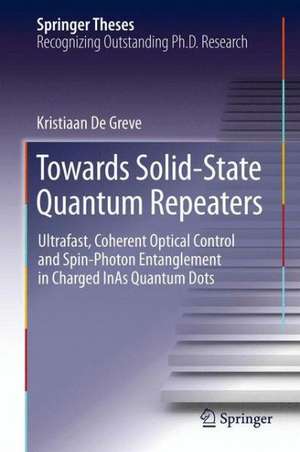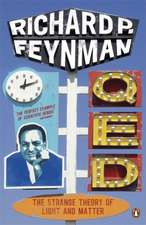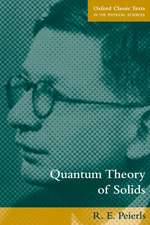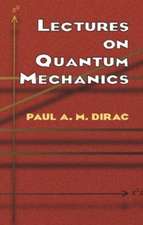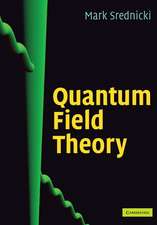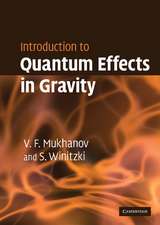Towards Solid-State Quantum Repeaters: Ultrafast, Coherent Optical Control and Spin-Photon Entanglement in Charged InAs Quantum Dots: Springer Theses
Autor Kristiaan De Greveen Limba Engleză Hardback – 3 iun 2013
Single spins in optically active semiconductor host materials have emerged as leading candidates for quantum information processing (QIP). The quantum nature of the spin allows for encoding of stationary, memory quantum bits (qubits), and the relatively weak interaction with the host material preserves the spin coherence. On the other hand, optically active host materials permit direct interfacing with light, which can be used for all-optical qubit manipulation, and for efficiently mapping matter qubits into photonic qubits that are suited for long-distance quantum communication.
| Toate formatele și edițiile | Preț | Express |
|---|---|---|
| Paperback (1) | 634.18 lei 6-8 săpt. | |
| Springer International Publishing – 23 aug 2016 | 634.18 lei 6-8 săpt. | |
| Hardback (1) | 639.25 lei 6-8 săpt. | |
| Springer International Publishing – 3 iun 2013 | 639.25 lei 6-8 săpt. |
Din seria Springer Theses
- 18%
 Preț: 997.88 lei
Preț: 997.88 lei -
 Preț: 389.88 lei
Preț: 389.88 lei - 15%
 Preț: 646.94 lei
Preț: 646.94 lei - 18%
 Preț: 943.43 lei
Preț: 943.43 lei -
 Preț: 399.29 lei
Preț: 399.29 lei - 18%
 Preț: 944.99 lei
Preț: 944.99 lei - 15%
 Preț: 636.80 lei
Preț: 636.80 lei - 18%
 Preț: 941.05 lei
Preț: 941.05 lei - 15%
 Preț: 643.16 lei
Preț: 643.16 lei - 15%
 Preț: 642.68 lei
Preț: 642.68 lei - 18%
 Preț: 1103.62 lei
Preț: 1103.62 lei - 20%
 Preț: 558.83 lei
Preț: 558.83 lei - 18%
 Preț: 1112.30 lei
Preț: 1112.30 lei - 18%
 Preț: 944.19 lei
Preț: 944.19 lei - 18%
 Preț: 1109.92 lei
Preț: 1109.92 lei - 18%
 Preț: 1217.27 lei
Preț: 1217.27 lei - 15%
 Preț: 640.06 lei
Preț: 640.06 lei - 15%
 Preț: 636.45 lei
Preț: 636.45 lei - 15%
 Preț: 640.06 lei
Preț: 640.06 lei - 15%
 Preț: 640.88 lei
Preț: 640.88 lei -
 Preț: 389.70 lei
Preț: 389.70 lei - 20%
 Preț: 563.91 lei
Preț: 563.91 lei -
 Preț: 393.35 lei
Preț: 393.35 lei - 15%
 Preț: 637.93 lei
Preț: 637.93 lei - 15%
 Preț: 641.85 lei
Preț: 641.85 lei - 18%
 Preț: 1225.94 lei
Preț: 1225.94 lei - 20%
 Preț: 551.36 lei
Preț: 551.36 lei - 18%
 Preț: 1229.10 lei
Preț: 1229.10 lei - 15%
 Preț: 639.25 lei
Preț: 639.25 lei - 18%
 Preț: 999.45 lei
Preț: 999.45 lei - 15%
 Preț: 640.06 lei
Preț: 640.06 lei - 18%
 Preț: 1220.45 lei
Preț: 1220.45 lei - 18%
 Preț: 1116.26 lei
Preț: 1116.26 lei - 18%
 Preț: 1110.72 lei
Preț: 1110.72 lei - 18%
 Preț: 1000.87 lei
Preț: 1000.87 lei - 18%
 Preț: 891.17 lei
Preț: 891.17 lei - 15%
 Preț: 640.06 lei
Preț: 640.06 lei - 5%
 Preț: 1154.07 lei
Preț: 1154.07 lei - 15%
 Preț: 635.96 lei
Preț: 635.96 lei - 15%
 Preț: 640.88 lei
Preț: 640.88 lei -
 Preț: 387.20 lei
Preț: 387.20 lei - 18%
 Preț: 1109.92 lei
Preț: 1109.92 lei -
 Preț: 385.25 lei
Preț: 385.25 lei -
 Preț: 385.25 lei
Preț: 385.25 lei - 18%
 Preț: 1112.30 lei
Preț: 1112.30 lei - 18%
 Preț: 999.45 lei
Preț: 999.45 lei -
 Preț: 386.99 lei
Preț: 386.99 lei - 15%
 Preț: 637.13 lei
Preț: 637.13 lei - 20%
 Preț: 554.21 lei
Preț: 554.21 lei - 20%
 Preț: 555.59 lei
Preț: 555.59 lei
Preț: 639.25 lei
Preț vechi: 752.06 lei
-15% Nou
Puncte Express: 959
Preț estimativ în valută:
122.32€ • 133.29$ • 103.07£
122.32€ • 133.29$ • 103.07£
Carte tipărită la comandă
Livrare economică 23 aprilie-07 mai
Preluare comenzi: 021 569.72.76
Specificații
ISBN-13: 9783319000732
ISBN-10: 331900073X
Pagini: 168
Ilustrații: XVII, 148 p. 75 illus., 63 illus. in color.
Dimensiuni: 155 x 235 x 15 mm
Greutate: 0.39 kg
Ediția:2013
Editura: Springer International Publishing
Colecția Springer
Seria Springer Theses
Locul publicării:Cham, Switzerland
ISBN-10: 331900073X
Pagini: 168
Ilustrații: XVII, 148 p. 75 illus., 63 illus. in color.
Dimensiuni: 155 x 235 x 15 mm
Greutate: 0.39 kg
Ediția:2013
Editura: Springer International Publishing
Colecția Springer
Seria Springer Theses
Locul publicării:Cham, Switzerland
Public țintă
ResearchCuprins
Introduction.- Quantum Dot Spin Qubits.- Ultrafast Control of Electron Spins.- Hadamard Gate.- Geometric Phase Gates.- Hole Spin Qubits.- Spin-Photon Entanglement.- Conclusion and Outlook.- A: Fidelity Analysis.- B: Electron Spin-Nuclear Feedback.- C: Heavy-Hole-Light-Hole Mixing.- D: Coherent Hole Rotation Model.- E: Hole Spin Device Design.- F: Visibility of Quantum Erasure.
Notă biografică
Dr. Kristiaan De Greve performed his research at Stanford University, and completed his Ph.D. in 2012. He has published articles in journals including Optics Express, Nature Physics, Physical Review B, Physics Review Letters, Nature Photonics, and Applied Physics Letters. Dr. De Greve is currently Postdoctoral Fellow in the Department of Physics at Harvard University.
Current Affiliation:
Kristiaan De Greve
Department of Physics
Harvard University
Cambridge, MA 02138
USA
Previous Affiliation:
Kristiaan De Greve
Department of Electrical Engineering
Stanford University
Stanford, CA 94305
USA
Current Affiliation:
Kristiaan De Greve
Department of Physics
Harvard University
Cambridge, MA 02138
USA
Previous Affiliation:
Kristiaan De Greve
Department of Electrical Engineering
Stanford University
Stanford, CA 94305
USA
Textul de pe ultima copertă
Towards Solid-State Quantum Repeaters: Ultrafast, Coherent Optical Control and Spin-Photon Entanglement in Charged InAs Quantum Dots summarizes several state-of-the-art coherent spin manipulation experiments in III-V quantum dots. Both high-fidelity optical manipulation, decoherence due to nuclear spins and the spin coherence extraction are discussed, as is the generation of entanglement between a single spin qubit and a photonic qubit. The experimental results are analyzed and discussed in the context of future quantum technologies, such as quantum repeaters.
Single spins in optically active semiconductor host materials have emerged as leading candidates for quantum information processing (QIP). The quantum nature of the spin allows for encoding of stationary, memory quantum bits (qubits), and the relatively weak interaction with the host material preserves the spin coherence. On the other hand, optically active host materials permit direct interfacing with light, which can be used for all-optical qubit manipulation, and for efficiently mapping matter qubits into photonic qubits that are suited for long-distance quantum communication.
Single spins in optically active semiconductor host materials have emerged as leading candidates for quantum information processing (QIP). The quantum nature of the spin allows for encoding of stationary, memory quantum bits (qubits), and the relatively weak interaction with the host material preserves the spin coherence. On the other hand, optically active host materials permit direct interfacing with light, which can be used for all-optical qubit manipulation, and for efficiently mapping matter qubits into photonic qubits that are suited for long-distance quantum communication.
Caracteristici
Nominated by Stanford University, USA, as an outstanding Ph.D. thesis Demonstrates for the first time quantum entanglement between a single InAs quantum dot spin qubit and a single photonic qubit at telecommunication wavelengths Provides a key element for future quantum networks based on quantum repeaters and quantum teleportation techniques
